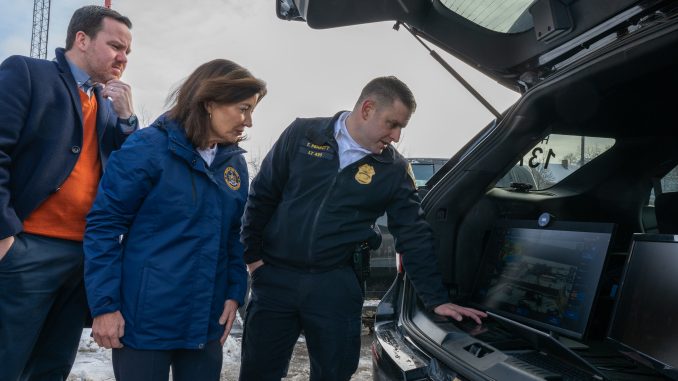
Site Will Be Used for Combating Crime, Intelligence Sharing
As part of her 2025 State of the State agenda, Governor Kathy Hochul recently proposed the creation of the nation’s first-ever Crime Analysis Joint Special Operations Command (CA-JSOC) Headquarters to help fight crime and coordinate intelligence sharing among hundreds of local, state and federal law enforcement entities. Hochul said she will propose expanded support for intelligence and agency coordination, and will secure additional funding for crime prevention technology and equipment to provide resources so local police departments and sheriffs’ offices can continue driving down crime in New York State, building off last year’s record funding for law enforcement technology.
“Public safety has been one of my top priorities since day one, and I am committed to doing everything I can to make sure that all New Yorkers and their families feel safe,” Hochul said. “By prioritizing coordination, intelligence sharing and investing in the latest technology, we are ensuring law enforcement agencies across the state have the resources and tools they need to prevent crimes and safeguard the future of our state.”
The Crime Analysis Centers (CACs) are vital to crime prevention and public safety in New York, with staff responding to requests for services from local police and prosecutors and providing hot-spot analysis, real-time investigative support and other assistance to law enforcement statewide. Under Hochul’s leadership, CAC funding has tripled, and the network has grown to eleven centers, which are supported by the State Division of Criminal Justice Services (DCJS) in partnership with local law enforcement agencies. The governor has also established New York State’s Joint Security Operations Center (JSOC) to serve as a 24/7 cybersecurity hub to coordinate responses to cyber threats
Staff at the Centers analyze and compile data and information in response to requests for service, providing real-time investigative support to officers as they are responding to reported crimes; analyses of emerging crime trends, crime patterns, and calls for service that inform officer and resource deployment; and detailed briefings that provide investigators with leads on specific cases they are handling. Their work has allowed law enforcement agencies to solve homicides, car thefts, retail crime rings, and remove illegal guns from communities across the State.
The U.S. Department of Justice recently recognized the Crime Analysis Center Network with an Excellence in the Field of Criminal Justice Award, one of six presented by the federal agency. About 210 crime analysts, investigators and other law enforcement personnel – funded by DCJS or assigned by partner local, state, and federal agencies – staff the Centers located in Albany, Broome, Erie, Franklin, Monroe, Niagara, Oneida, Onondaga, Orange, and Suffolk counties, and Manhattan. More than 350 law enforcement agencies in 59 counties allow the centers to access records management systems, which include arrests, reported crimes, accident reports, traffic tickets and other calls for service; domestic incident reports; parole and probation records; and public surveillance camera systems, among other data and information sources.
Rossana Rosado, the commissioner of the state’s Department of the Criminal Justice Systems Department, said, “These proposals will further expand information and data sharing among local, state and federal agencies and leverage technology to allow agencies to continue to drive down crime and improve public safety.”
“This new joint operations center expands on the close partnerships we have built with our local, state and federal law enforcement partners, which is critically important as we fight the constantly evolving threats to public safety,” State Police Superintendent Steven G. James said.

